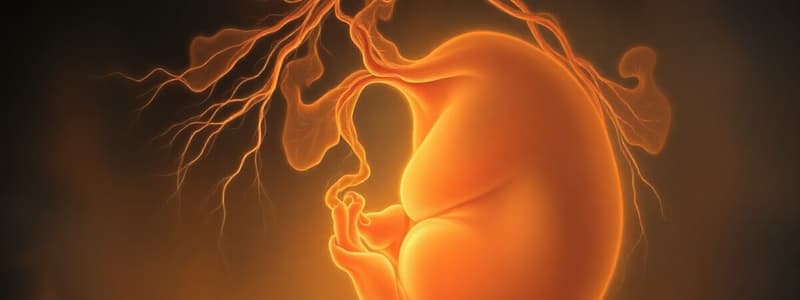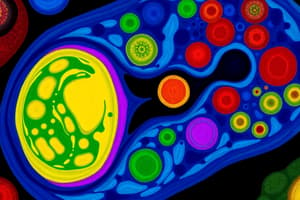Podcast
Questions and Answers
What primary process occurs during gastrulation?
What primary process occurs during gastrulation?
- Formation of ectoderm and endoderm
- Formation of mesoderm and endoderm
- Formation of all three germ layers (correct)
- Differentiation of the amniotic cavity
Which statement best describes the primitive streak?
Which statement best describes the primitive streak?
- It is clearly visible at day 10 of embryonic development.
- It is established at the cephalic end of the embryo.
- It is a structure that forms on the surface of the hypoblast.
- It is a narrow groove appearing on the surface of the epiblast. (correct)
What is the significance of fibroblast growth factor 8 (FGF8) during gastrulation?
What is the significance of fibroblast growth factor 8 (FGF8) during gastrulation?
- It promotes the development of the ectoderm layer.
- It regulates cell specification into the mesoderm. (correct)
- It controls the outward movement of cells from the epiblast.
- It initiates the formation of the amnion.
What happens to the epiblast cells upon reaching the primitive streak?
What happens to the epiblast cells upon reaching the primitive streak?
At what embryonic stage is the primitive streak clearly visible?
At what embryonic stage is the primitive streak clearly visible?
What role do cells play in the formation of the embryonic endoderm during gastrulation?
What role do cells play in the formation of the embryonic endoderm during gastrulation?
Which germ layer is derived from cells that remain in the epiblast after gastrulation?
Which germ layer is derived from cells that remain in the epiblast after gastrulation?
What is the primary function of the prechordal plate during gastrulation?
What is the primary function of the prechordal plate during gastrulation?
How do cells migrate during gastrulation?
How do cells migrate during gastrulation?
What characterizes the oropharyngeal membrane in relation to the embryonic development?
What characterizes the oropharyngeal membrane in relation to the embryonic development?
What is the first structure formed by the prenotochordal cells during notochord formation?
What is the first structure formed by the prenotochordal cells during notochord formation?
Which layer is NOT formed during the advanced stage of embryonic development at 14-15 days?
Which layer is NOT formed during the advanced stage of embryonic development at 14-15 days?
How does the notochord grow during development?
How does the notochord grow during development?
What is the primary function of the notochord in vertebrate development?
What is the primary function of the notochord in vertebrate development?
What is the role of the allantois in human development?
What is the role of the allantois in human development?
What connects the amniotic and yolk sac cavities during embryonic development?
What connects the amniotic and yolk sac cavities during embryonic development?
What does the cloacal membrane primarily consist of?
What does the cloacal membrane primarily consist of?
At what stage do definitive endoderm and differentiation of mesoderm occur?
At what stage do definitive endoderm and differentiation of mesoderm occur?
Flashcards
Gastrulation
Gastrulation
The process of forming the three germ layers: ectoderm, mesoderm, and endoderm. It begins with the formation of the primitive streak on the epiblast, where cells migrate towards and detach from the epiblast to form the mesoderm and endoderm.
Primitive Streak
Primitive Streak
A structure that forms during gastrulation. It is a thickened band of cells on the epiblast. Cells migrate towards the primitive streak, detach from the epiblast, and move underneath it to form the mesoderm.
Epiblast
Epiblast
The layer of cells on the surface of the embryo that forms the ectoderm.
Endoderm
Endoderm
Signup and view all the flashcards
Mesoderm
Mesoderm
Signup and view all the flashcards
Migrating Cells
Migrating Cells
Signup and view all the flashcards
Prechordal Plate
Prechordal Plate
Signup and view all the flashcards
Oropharyngeal Membrane
Oropharyngeal Membrane
Signup and view all the flashcards
Notochord
Notochord
Signup and view all the flashcards
Primitive pit
Primitive pit
Signup and view all the flashcards
Allantois
Allantois
Signup and view all the flashcards
Cloacal Membrane
Cloacal Membrane
Signup and view all the flashcards
Prenotochordal Cells
Prenotochordal Cells
Signup and view all the flashcards
Notochordal Plate
Notochordal Plate
Signup and view all the flashcards
Definitive Notochord
Definitive Notochord
Signup and view all the flashcards
Hypoblast
Hypoblast
Signup and view all the flashcards
Connecting Stalk
Connecting Stalk
Signup and view all the flashcards
Study Notes
Gastrulation
- The process of forming the mesoderm and endoderm.
- Begins with the formation of the primitive streak on the epiblast.
- Involves cells migrating towards the primitive streak, where they become flask-shaped, detach from the epiblast, and move underneath it.
- Controlled by fibroblast growth factor 8 (FGF8), synthesized by streak cells themselves, which controls cell specification into the mesoderm.
- Results in the formation of the three germ layers: ectoderm, mesoderm, and endoderm.
Cell Migration During Gastrulation
- Cells move between the epiblast and hypoblast layers.
- Spread laterally and cranially, extending beyond the disc margin.
- Establish contact with extraembryonic mesoderm covering the yolk sac and amnion.
- Migrate in the cephalic direction, passing along each side of the prechordal plate.
Prechordal Plate
- Forms between the notochord tip and the oropharyngeal membrane.
- Derived from cells migrating through the node in the midline.
- Crucial for forebrain induction.
Oropharyngeal Membrane
- Situated at the cranial end of the disc.
- Consists of closely adhering ectoderm and endoderm cells.
- Represents the future opening of the oral cavity.
Notochord Formation
- Begins with prenotochordal cells originating from the primitive node and moving cranially to the prechordal plate.
- Prenotochordal cells intercalate in the hypoblast, forming a two-layered notochordal plate for a short time.
- Notochordal plate cells detach from the endoderm to form the definitive notochord.
- Serves as an important signaling center for inducing the axial skeleton.
- Grows dynamically from cranial to caudal.
- Extends from the prechordal plate cranially and caudally to the primitive pit.
- The primitive pit forms an indentation in the epiblast, temporarily connecting the amniotic and yolk sac cavities through the neurenteric canal.
Cloacal Membrane
- Forms at the caudal end of the embryonic disc.
- Similar in structure to the oropharyngeal membrane, consisting of tightly adherent ectoderm and endoderm cells, with no intervening mesoderm.
- When the cloacal membrane forms, the posterior wall of the yolk sac develops a small diverticulum (allantois) that goes into the connecting stalk.
- The allantois, a diverticulum that appears around the 16th day, may play a role in bladder development abnormalities.
Studying That Suits You
Use AI to generate personalized quizzes and flashcards to suit your learning preferences.



